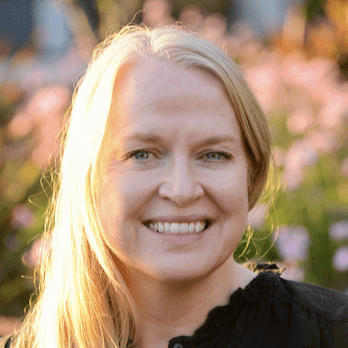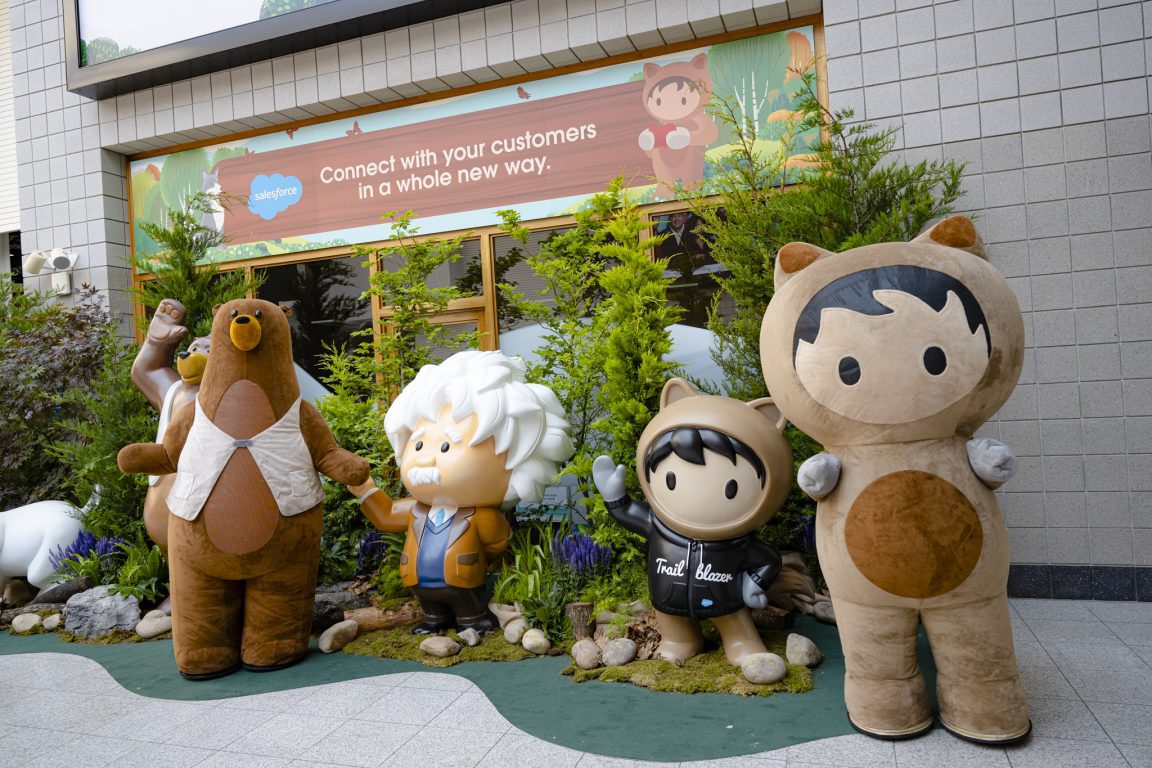Salesforce on why the future of work is flexible
UNLEASH caught up with Angela McKenna, EVP of employee success for EMEA, at Salesforce’s World Tour event in London.
Why You Should Care
Employers are grappling with the right future of work for their organization.
Here is what Salesforce are up to.
Find out why becoming digital-first is essential to the perfect hybrid model.
Live events are back and UNLEASH was lucky enough to be invited to Salesforce’s World Tour at the ExCel center in London back in June.
Salesforce used the conference to really celebrate the success of its customers and the wider community – who it calls Trailblazers – as well as its employees during the pandemic.
The event also reflected on the ongoing challenges that companies in the UK (and further afield) are facing currently – this includes the war in Ukraine and its impact on global supply chains, labor shortages, and figuring out the right future of work model.
While UK senior vice-president of customer success Simon Macklin shared in his keynote that the aim of Salesforce’s technology is to “unleash productivity”- great phrasing there – especially since its acquisition of Slack last year, the event also put a spotlight on the tech giant’s own approach to the workforce challenges, and particularly the future of work.
Salesforce has embraced a ‘Success from Anywhere, Careers Everywhere’ strategy. Instead of focusing on where people work, Salesforce is looking closely at how they work and empowering great experiences for everyone whether they are in the office or in remote locations.
Success from Anywhere at Salesforce
“Flexibility.. is top of mind for people”, Angela McKenna, executive vice-president of employee success (which is what Salesforce calls its HR team) for EMEA, tells UNLEASH at the World Tour conference.
She continues: “If there’s one thing that you can do that will help you gain employee engagement, think about what flexibility looks like for you [and your employees]”.
The best way to find out what employees want is to listen to them. But listening is not enough on its own, leaders then need to actually make business decisions and take action based on what they tell you.
This is why Salesforce is not implementing a return to office mandate – “I worry about companies that are going down that route”, shares McKenna. “We would never ever do that because we fundamentally believe that we’re never going back to the way things used to be before”.
Instead, the tech giant has created Flex Team Agreements. This is where “every single team at Salesforce comes together to create their own core agreement…on how they want to work”.
McKenna gives the example of her employee success team in EMEA – “we’ve got huge flexibility, but I also heard that people wanted to come together”, so now on Wednesdays, she goes to Salesforce’s London office. This means if her team wants some one-on-one time with her, they could choose to come into the office on Wednesday.
Across Salesforce globally, 59% of employees came in at least once a week in May (the London office was particularly popular, it was the second most attended Salesforce office in the world after the headquarters (HQ) in San Francisco – Wednesday and Thursdays were the most popular days, followed by Tuesdays.
Rethinking office spaces
Of course, Salesforce’s hybrid future of work model means that the office (or what the company terms the ‘physical HQ’) will continue to have an important role in the world of work.
“We believe that people need to gather”, but just not in the same way as before. The idea isn’t for people to come back to the office, and then sit in back-to-back virtual meetings all day. “We’ve really challenged ourselves and our leaders to ask: why would people come back?”, and then rethink the design of the office with those reasons in mind.
“People want to come back to develop relationships” – McKenna is clear that you can develop those digitally, but “you also need the back and forth” of in-person discussions connection.

Angela McKenna, EVP of employee success, EMEA, Salesforce.
So rather than having X number of seats, the leadership team at Salesforce is thinking about “the space needed to bring the team together to collaborate”. Salesforce is still experimenting, and currently employees are primarily coming into the office when big events are happening, like Town Halls, All Hands, and team offsites.
Another way Salesforce is rethinking the future of connection is with its Trailblazer Ranch.
Inspired by the findings of the latest employee listening survey, the tech employer realized “we need to bring back the spontaneity and joy that comes from being together in person”, as CPO Brent Hyder wrote in a February blog post.
The Ranch, which McKenna describes as “phenomenal”, aims to build connection and company culture, but it also operates as a way to “come…together to share, to celebrate, to acknowledge each other”.
Salesforce is applying the principles of the Ranch to all of its offices, and how we think about them. “We’re thinking about outposts across the globe, so we can create the same spaces for people to connect”.
A digital HQ is more important than the physical HQ
While the physical officeis important to Salesforce, the tech giant is also really focusing on creating a digital HQ. In fact, it is keen for the digital HQ to become “more important than the physical HQ”.
The idea is by creating a digital-first workplace, which is obviously not the same as never meeting in person, employees are empowered to work however is best for them.
For Salesforce, the digital HQ is forged through Slack, and it really emphasizes the company’s commitment to allowing people to work where they are most productive and successful.
Slack has driven further productivity for Salesforce – data shows meetings are down 7%, emails have reduced by 42% and more asynchronous conversations are going on with the help of integrated apps like Huddle and Clips.
The prioritization of a digital HQ, ties in closely with its desire to be an inclusive and equitable workplace and avoid proximity bias where those at home get overlooked for promotions and pay rises because they are ‘out of sight, out of mind’.
McKenna shares that her employee success team did an offsite a month ago. “We had about 10% people who could travel, so on each table, we had two people who were there, and two people who were remote, and they were totally included”.

Salesforce World Tour, London.
As a result, McKenna advises that other companies and HR teams really get on board with building a digital HQ. She calls on her peers outside of Salesforce to figure out what systems and technology need to underpin a successful digital-first approach to work.
For Salesforce it may be Slack, but other tech tools might work better for different types and sizes of organizations.
Purpose and the ‘Great Resignation’
While Salesforce’s attitude toward flexible working will no doubt help it thrive in the ‘Great Resignation’, McKenna also talks about the role the company’s values and purpose are playing.
“We have not been immune from the ‘Great Resignation”, but “our retention rates are really good compared to our peers”.
Given how much of people’s lives they spent at work, people want to know that they are working somewhere that cares about the “greater good”, and that aligns with their values.
McKenna believes that Salesforce provides this; she notes that the company “has done a really good, intentional job of being super focused on values” – its five core values are trust, customer success, innovation, equality, and sustainability.
“As we’ve gotten bigger, we have been very deliberate about this idea of culture-first, policy second”. Business is not just about the transaction, but also about the wide impact on our communities and society as a whole. McKenna adds: “You always hear our CEO [Marc Benioff] saying values drive value in the business of business”.
For McKenna, the proof is in the pudding. While people have experienced the desire to “do something different”, “we’ve seen a lot of boomerangs”.
Salesforce is very good at leaving the door open and saying that employees are always welcome back. “We actually have an alumni program, and we encourage people to opt-in when they leave”.
McKenna shares that when she tells her HR colleagues in other organizations about Salesforce’s approach, they say “we sweep it under the carpet”, once a person has left the organization “they should never be spoken of again”.
It looks like the ‘Great Return’, which UNLEASH first mused about in November 2021, may come to fruition. Now is the time to rethink your approach to exit interviews and how you treat outgoing employees.
Want to hear more from UNLEASH? Sign up now for free access to all our online content, exclusive reports, as well as discounts for our events.
Sign up to the UNLEASH Newsletter
Get the Editor’s picks of the week delivered straight to your inbox!

Chief Reporter
Allie is an award-winning business journalist and can be reached at alexandra@unleash.ai.
